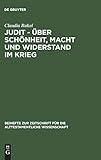Judit – über Schönheit, Macht und Widerstand im Krieg : Eine feministisch-intertextuelle Lektüre / Claudia Rakel.
Material type: TextSeries: Beihefte zur Zeitschrift für die alttestamentliche Wissenschaft ; 334Publisher: Berlin ; Boston : De Gruyter, [2015]Copyright date: ©2003Edition: Reprint 2014Description: 1 online resource (326 p.)Content type:
TextSeries: Beihefte zur Zeitschrift für die alttestamentliche Wissenschaft ; 334Publisher: Berlin ; Boston : De Gruyter, [2015]Copyright date: ©2003Edition: Reprint 2014Description: 1 online resource (326 p.)Content type: - 9783110179262
- 9783110899986
- Theology and Religious Studies -- Old Testament and Ancient Near East -- Apocrypha and Pseudepigrapha -- Apocrypha and Pseudepigrapha, others
- Theology and Religious Studies -- Old Testament and Ancient Near East -- Israel and the Ancient Near East -- Ancient Near East
- Feministische Theologie
- Intertextualität
- Judith (Buch)
- RELIGION / Biblical Criticism & Interpretation / Old Testament
- 220
- online - DeGruyter
- Issued also in print.
| Item type | Current library | Call number | URL | Status | Notes | Barcode | |
|---|---|---|---|---|---|---|---|
 eBook
eBook
|
Biblioteca "Angelicum" Pont. Univ. S.Tommaso d'Aquino Nuvola online | online - DeGruyter (Browse shelf(Opens below)) | Online access | Not for loan (Accesso limitato) | Accesso per gli utenti autorizzati / Access for authorized users | (dgr)9783110899986 |
Dissertation Universität Bonn 2002.
Frontmatter -- Vorwort -- Inhalt -- A. Eine feministisch-intertextuelle Lektüre des Juditbuches Methodologische Überlegungen -- B. Das Juditbuch im Homont der Kriegs- und Geschlechterproblematik -- C. Ein „Text im Text" Jdt 16,1b-17 im Kontext des Juditbuches -- D. Ein Close Reading von Jdt 16,1b-17 -- E. Macht - Schönheit - Gewalt Jdt 16,lb-17 als Abschluss eines intratextuellen Gewebes -- F. Das Buch Judit im intertextuellen Gefüge der Septuaginta -- G. Verwirrung und Politik -- Anhang
restricted access online access with authorization star
http://purl.org/coar/access_right/c_16ec
Das Buch Judit enthält eine Vielzahl intertextueller Bezüge. Vorbilder für die Juditfigur waren nicht nur Mose, David und Judas Makkabäus, sondern auch biblische Frauengestalten, die Gewalt erfahren oder selber ausüben, ebenso wie weibliche Personifikationen der Stadt Jerusalem. Im Zentrum der Studie steht das Lied in Jdt 16,1-17, das eine theologische Deutung der Ereignisse des Juditbuches liefert und die Aussage vertritt, dass Gott Kriege zerschlägt. Das Buch Judit wird im intertextuellen biblischen Dialog als ein Plädoyer für Widerstand gegen Gewaltregime gelesen, nicht mit den Mitteln des Krieges, sondern mit dem strategischen Einsatz weiblicher Schönheit.
The Book of Judith contains a veritable wealth of intertextual references. Models for the figure of Judith were not just provided by Moses, David and Judas Maccabeus, but also by biblical female figures who were either the victims or themselves the perpetrators of violence. The study is centred on the song in Judith 16, 1-17, which provides a theological interpretation of the events in the Book of Judith and puts forward the statement that God crushes wars. In the intertextual biblical dialogue, the Book of Judith is read as a plea for resistance to a violent regime, not with warlike means but through the strategic deployment of female beauty.
Issued also in print.
Mode of access: Internet via World Wide Web.
In German.
Description based on online resource; title from PDF title page (publisher's Web site, viewed 28. Feb 2023)


